|
In celebration of the Fourth General Congress of the Union of the Catholic Apostolate, the Catholic Apostolate Center will share weekly homilies from the Congress. Homily for July 17, 2024 “Guide us your people, so that we may contribute to the building of a new society, at the service of the life of every person, of hope and concrete solidarity with all in different cultures” (From the Prayer for the fourth UAC General Congress) Dear Brothers and Sisters of the Pallottine Family,
Once again, we have taken another theme for our reflection from the Prayer for the fourth UAC General Congress: “Guide us your people, so that we may contribute to the building of a new society, at the service of the life of every person, of hope and concrete solidarity with all in different cultures.” As Christians, as members of the Union of Catholic Apostolate, we are invited to build a better world. We wish to be in service of life and want to work for the integral development of every human being created in God’s own image and likeness. The members of the Union of Catholic Apostolate have an immense responsibility to be missionary disciples to work hard to build up societies and communities built on the values of the Gospel. In his book “Let us Dream. The Path to a Better Future,” written during the dark days of Covid-19 (2020), Pope Francis speaks about his dream of building a better future for humanity. The Holy Father points out the absolute importance of authentic human connectedness in every sphere of life. He believes that it is time to restore an ethics of fraternity and solidarity, regenerating the bonds of trust and belonging among people, nations and cultures. The Pope also points out four elements that can block the action of the Holy Spirit – narcissism, discouragement, pessimism and indifference. The authentic manifestations of an Easter people are joy and renewed hope. We can be discouraged very often by ongoing conflicts and violence. However, the people who changed the world are those who kindled the candle of hope and courage and not those who surrender themselves to pessimism and defeatism. Our efforts as members of the Union of Catholic Apostolate to build up a better world should not be seen as only a socio-political action. One of the modern saints of our times who set in motion a revolution of fraternal charity was the tiny woman, Saint Mother Teresa. She had faith as the foundation, hope as its driving force, and charity as its goal. She was convinced from the beginning of her work with the poor that it was God’s work that she was doing, and whatever she did for anyone she did it for Jesus. It was based on faith because she was feeding Jesus in the hungry. Every human being is a child of God, to be respected and loved as such. Each human being is an embodiment of God’s love, no matter where he comes from or what religion he belongs to. What is essential to us is our common brotherhood in the one and only Fatherhood of God. St. Vincent Pallotti too had seen the hungry Christ, the thirsty Christ, the naked Christ, the homeless Christ, the sick and imprisoned Christ everywhere (cf. Matthew 25:31-36). For Pallotti, it was the continuation of the mission of compassion, the salvific work of Jesus. That was why he prayed so ardently: “I would like to become food to feed the hungry, clothing to cover the naked, drink to quench the thirsty….” (OOCCX, 115). We are blessed to have today the presence of the participants of the Central Assembly of the Pallottine Missionary Sisters. These are members of the General Council, the Provincial Superiors and delegates from all the Provinces, Regions and Delegatures of the Congregation. Recently, I received a video from Sr. Cecile, the Principal of the Pallottine School at Masaka, Tanzania. We could see the beautiful children dressed up in their school uniform. We could also see how the entire campus was maintained with great attention for the protection of our Common Home. Those who were involved in developing the School will know how much sacrifices were made in establishing the School and in offering quality education to hundreds of children. We can have many examples of such apostolic activities done by our priests, sisters and lay members around the world. In our efforts to build up a better world, particular attention needs to be given to children and vulnerable persons. We heard in today’s Gospel: “At that time Jesus exclaimed, ‘I bless you, Father, Lord of heaven and of earth, for hiding these things from the learned and the clever and revealing them to little children. Yes, Father, for that is what it pleased you to do.” (Matthew 11:25-26) These words show the unique place the little children enjoy before God and hence we need to care for them and protect them. Giving them good education brings great rewards. Today we celebrate the memory of Blessed Elizabeth Sanna, the spiritual daughter of our Founder. This handicapped mother who was outstanding in fraternal charity and holiness of life reminds us of all the vulnerable persons around the world and who need particular attention. Recently the Dicastery for Laity, Family and Life came out with a small document called “An Unlimited Joy,” based on the contributions collected during the Synod Listening Session. The question was "In a Synodal Church in mission, how can the co-responsibility of the faithful with disabilities be fostered?” A response given to this question was: “First of all, it requires attentive listening and concrete commitment on the part of every ecclesial community. In the Synodal Church everyone listens to each other and it is necessary to give conscious and qualified attention to all the faithful, without exceptions, even to those who experience disabilities, but a proactive attitude is needed on the part of everyone. In other words, our active participation in the life of the Church requires the involvement of each and every one of us.” Dear Brothers and Sisters of the Pallottine Family, we have to listen to the cry of God’s people. The Union of Catholic Apostolate, through the active and responsible participation of all its members, must continue the saving and healing mission of Jesus. Matthew 25:31-46, on the last judgment, must challenge every member. The judgment will be made on the basis of concrete love given or denied to one of the least of our brothers and sisters because Jesus himself is present in each one of them. Amen. Fr. Jacob Nampudakam, S.A.C. UAC President
0 Comments
The past two months we have gotten to celebrate the feast days of many incredibly saints who can be role models for us throughout all the ups and downs of life. This September is no different. As we transition out of summer and enter into new routines in the midst of the continuing pandemic, we can turn to many of the saints this month who are known for their healing and ability to help others grow in their faith. Saints Known for Physical Healing Earlier this month on September 1st, we celebrated the feast of St. Giles. I had never heard of St. Giles until I read a blog post, from the early days of the coronavirus pandemic, about the 14 Holy Helpers. But the more I got to learn about St. Giles, the more his life inspired my own personal faith journey. Even though an injury crippled one of his legs, St. Giles was known for his miracle-working abilities for those who came to him. His mission as a miracle-worker was always centered on others, not himself. A similar selflessness was seen by two martyrs in the early Church, Sts. Cosmas and Damian, whose feast we will celebrate on September 26th. They both were doctors and did not accept payment for any of their services, recognizing the humanity in each person. They utilized their God-given skills to help anyone in need, which led them to become recognized as the patron saints of physicians. All three of these saints remind me that while this world is not our final destination, taking care of our earthly bodies remains very important. In whatever way we may need physical healing, God is eager to hear us and to help us physically as we continue to live out His mission here on Earth. Saints Known for Spiritual Healing Next week, we will celebrate the feast of Our Lady of Sorrows. The Marian feast of Our Lady of Sorrows is special because it is about the spiritual turmoil Mary experienced during her life. This is why Our Lady of Sorrows is typically represented by seven daggers piercing her heart. For me, Our Lady of Sorrows is not just about praying for the intercession of Mary, but also placing our complete trust in the Lord, just like she did throughout the sorrows in her life. This trust was also central to St. Padre Pio’s ministry. He recognized the need for spiritual healing and committed to hearing Confessions, and he understood the significant act of faith it took to go to Confession. Through the intercession of Our Lady of Sorrows and St. Padre Pio, may we take time this month to trust God with spiritual healing in our lives. Role Model Saints for Spiritual Growth This month is bookended by two saints who are role models for integrating spiritual growth into the activities of their daily life: St. Teresa of Calcutta, whose feast was celebrated on September 5th, and St. Vincent de Paul, whose feast will be celebrated on September 27th. The interesting thing about these saints is that they both could have fallen into the categories of physical healing or spiritual healing. But for me, these well-known saints have been role models for integrating caring for other people with spiritual growth. It seems easy to get so focused on our work that we forget the deeper meaning behind it. Mother Teresa and St. Vincent de Paul worked to help those in need, and they saw Christ in everyone and in every task they did. While we may not be feeding the poor of Calcutta every day, we too can try to grow spiritually by seeing Christ in every aspect of our day. As we continue throughout this month of September, let us ask for the saints’ intercession for healing and learn from their lives in order to grow closer to Christ. To learn more about the saints, visit our Catholic Feast Days Website by clicking here. To view a calendar of the feast days in September, and each month, click here.
Having experienced the Petrine ministry of Pope Francis for over five years now, it should be of no surprise that the Jesuit former Archbishop of Buenos Aires took the name Francis, the first time that name had been chosen in the 2000+ year history of the Catholic Church. The name was taken for St. Francis of Assisi, a 13th century saint who left behind a life of luxury and wealth to pursue a life lived according to the Gospel. One of the more famous stories tells of St. Francis’ public witness of faith when his own father brought him before the bishop on charges of theft. Francis famously stripped off his clothes and announced that "Pietro Bernardone is no longer my father. From now on I can say with complete freedom, 'Our Father who art in heaven.'" Much like St. Francis, Pope Francis has also stripped himself of luxurious garments, choosing to present himself in modest, humble clothing that is still fitting to the Papacy. Such action is not solely a living witness of the message of St. Francis, but also the message of Christ who said, “If you wish to be perfect, go, sell what you have and give to [the] poor, and you will have treasure in heaven. Then come, follow me.” In Jorge Bergoglio’s ministry as Archbishop of Buenos Aires, his commitment to simple living was made manifest through his actions. He was seen riding a bus with other bishops instead of using his designated private transportation; he cooked his own meals, and he even chose to live in a small apartment outside of the usual bishop’s residence. Pope Francis’ witness teaches us that a simple life does not mean a life lived passively. Simplicity requires action. One must live and act in a way that honors the life of simplicity and humility to which we are called by the Gospels. In living out the witness of St. Francis and the call of Christ, Pope Francis has also put a great influence on caring for the marginalized—whether migrants, the homeless, or any of those in need. Just recently, Pope Francis surprised Cardinal Konrad Krajewski and around 280 homeless persons at a Vatican dinner where he dined with them for over two hours and listened to their stories. On Holy Thursday 2017, Pope Francis washed the feet of twelve inmates at a prison about 45 miles from Rome, to honor Christ who reminded his apostles that “whoever wishes to be great among you shall be your servant.” That teaching is one that should resonate deeply with us. Simplicity does exactly that, it allows us to live in solidarity with those most in need and live lives conformed to Christ. The lives of Pope Francis and St. Francis of Assisi provide a witness to a life lived as Christ instructed. We’re not expected to exactly follow the path of St. Francis, as his life is a remarkable one, but, as Mother Teresa said, we can serve by performing small deeds done with great love. Let our Holy Father and St. Francis of Assisi continue to be examples to us in living out or vocations of holiness, and may we always pray for our Holy Father and his ministry. Questions for Reflection: What are some easy ways that I can live more simply? What luxuries is the Lord calling me to give up? 5/1/2018 Everyday Holiness: Ten Quotes from Pope Francis’ Apostolic Exhortation to Help You Be Holy in Today’s WorldRead NowOn April 9, the Solemnity of the Annunciation of the Lord, Pope Francis released his latest Apostolic Exhortation: Gaudete et Exsultate (Rejoice and Be Glad): On the Call to Holiness in Today’s World. This is the third Apostolic Exhortation of his papacy, following Evangelii Gaudium, the Apostolic Exhortation on the Proclamation of the Gospel in Today’s World and Amoris Laetitia, a post-synodal Apostolic Exhortation on Love in the Family. What was his goal? “To re-propose the call to holiness in a practical way for our own time, with all its risks, challenges and opportunities" (GE 2). Without delving too much into a theological or heady definition of holiness, Pope Francis invites us simply and straightforwardly to open ourselves to the specific and unique mission God has created us for. In this, he says, lies true joy and freedom. Our Holy Father takes us back to the Source of Holiness, Jesus Christ, and encourages us to look to the Beatitudes as guides for holiness. Below, I’ve compiled some of my favorite quotes and key take-aways from this approachable, yet profound, exhortation. 1.“The Lord asks everything of us, and in return he offers us true life, the happiness for which we were created. He wants us to be saints and not to settle for a bland and mediocre existence.” -GE 1 Pope Francis echoes his predecessors in reminding us that following Christ leads to an abundant, joyful, and exciting life. We often do not equate holiness to greatness, but that’s what it is. Though God expects a lot from us, he gives us so much more: true life and happiness. Our Holy Father is reminding us that holiness makes us truly happy by calling us to live abundantly. 2. Holiness is the most attractive face of the Church. -GE 9 Many of us might have grown up thinking that holiness is boring and that sanctity is impossible, so why is Pope Francis saying that holiness is the most attractive face of the Church? What does this mean? When we embrace holiness, we become who we were created to be; we become our most authentic selves. This authenticity, this freedom, is attractive. It makes the Church come alive through each of her members. When we are striving for holiness, we are becoming our best and most loving selves. This witness is what evangelizes – it invites others to pursue their own journey of holiness. 3.The important thing is that each believer discern his or her own path, that they bring out the very best of themselves, the most personal gifts that God has placed in their hearts (cf. 1 Cor 12:7), rather than hopelessly trying to imitate something not meant for them. We are all called to be witnesses, but there are many actual ways of bearing witness. -GE 11 Oftentimes, it’s easy to compare ourselves with others. It’s tempting to see the gifts and talents of others and ask ourselves why we do not have the same. The Body of Christ is made up of all different parts – each necessary for the functioning, health, and well-being of the body itself. Here, Pope Francis reminds us that there are as many paths to holiness as there are people. Each of us was designed specifically by God for a unique purpose. We do not have to become St. Francis, St. Vincent Pallotti, St. Mother Teresa, St. Joan of Arc, or St. Francis de Sales. We become saints by becoming most fully and authentically who God made us to be: ourselves. 4.To be holy does not require being a bishop, a priest or a religious. We are frequently tempted to think that holiness is only for those who can withdraw from ordinary affairs to spend much time in prayer. That is not the case. We are all called to be holy by living our lives with love and by bearing witness in everything we do, wherever we find ourselves. – GE 14 In this passage, Pope Francis reminds us of the universal call to holiness which has its inception in the Gospel and which the Church has explicitly reminded us since the closing of the Second Vatican Council. Holiness is not reserved for those with theology degrees, the ordained, monks, or religious. It is not reserved for those who work for the Church or volunteer with acts of service. It is for each and every one of us: the high school student studying for exams, the single parent, the politician developing laws for his or her constituents, the factory worker, the refugee far from home, the married couple starting or raising a family, the list goes on and on. Whatever vocation, profession, or place in life we find ourselves in, let us infuse it with love in order to become holier each and every day. 5.In the Church, holy yet made up of sinners, you will find everything you need to grow towards holiness. The Lord has bestowed on the Church the gifts of scripture, the sacraments, holy places, living communities, the witness of the saints and a multifaceted beauty that proceeds from God’s love, “like a bride bedecked with jewels” (Is 61:10). -GE 7 Sometimes the journey of holiness seems impossible. We can get tired and beaten down by our own weaknesses and failures, and by the multitude of temptations and trials that seem to present themselves at every step. Here, Pope Francis is reminding us that Jesus Christ gives us everything we need to be holy. Our growth in holiness cannot exist apart from Christ’s Church. Though the Church is not perfect, it is in the Body of Christ that we have access to Scripture, the sacraments, and community, so that we can have the help of others who are also striving for holiness. Do not forget to use these invaluable resources, to go back often and drink from the well of life, in order to get the strength you need to continue your journey of holiness. 6. This holiness to which the Lord calls you will grow through small gestures. -GE 16 This quote reminds me of the often-referred to statement of St. Mother Teresa: “…do small things with great love.” Holiness does not happen overnight. It involves millions of decisions and actions – each one leading us closer to or further away from our goal. Pope Francis reminds us that we are called to grow in holiness in a way that may seem small and ordinary. Cleaning a dish can become an act of holiness—so can changing a diaper, writing a paper, tending a garden, submitting a work report, or sitting in traffic. Greatness, then, lies in the little things. This is the little way St. Therese of Lisieux shared with the Church. It can lead to great sanctity. 7.Each saint is a mission, planned by the Father to reflect and embody, at a specific moment in history, a certain aspect of the Gospel…Every saint is a message which the Holy Spirit takes from the riches of Jesus Christ and gives to his people. -GE 19, 21 Each of us are a product of our times. We were born at a specific time and place in order to live out a specific mission. We don’t often think ourselves as “a mission,” as Pope Francis says, or as “a message,” but these are beautiful ways to think about our lives and the weight and dignity of each one. By thinking about our lives in this way, we see that each of us is planned by the Father at this exact moment in time and that our lives, actions, and interactions with others are invaluable. If we do not share the message God created us to impart, no one else will. 8.Just as you cannot understand Christ apart from the kingdom he came to bring, so too your personal mission is inseparable from the building of that kingdom…Your identification with Christ and his will involves a commitment to build with him that kingdom of love, justice and universal peace. -GE 25 After Christ’s Resurrection and before his Ascension into heaven, he gave his disciples a clear command: “Go, therefore, and make disciples of all nations, baptizing them in the name of the Father, and of the Son, and of the holy Spirit.” The same commission resounds for us today. Jesus came not only to overcome sin and death, but to build his kingdom on earth. For this reason, Pope Francis reminds us that we “cannot understand Christ apart from [his] kingdom.” Before joining Christ in Heaven, we’ve got work to do. We join Christ in his mission by working to create a world of “love, justice and universal peace.” Holiness, therefore, is not for us alone, but for society, for others, and for the world. 9.The presence of constantly new gadgets, the excitement of travel and an endless array of consumer goods at times leave no room for God’s voice to be heard…Sooner or later, we have to face our true selves and let the Lord enter. -GE 29 The world today is an incredibly noisy place. Our access to technology enables us to be plugged in at almost every moment of the day. We see screens on our computers, smartphones, and televisions; we are bombarded by advertisements; we spend hours on social media. Without demonizing technology or refuting its benefits, Pope Francis reminds us of the temptation to drown out the voice of God with noise. If we are unable to hear the voice of God, then we will be unable to attain the holiness to which we are called. How can we carve out more time for God today in silence and in prayer? 10.Do not be afraid of holiness. It will take away none of your energy, vitality or joy. On the contrary, you will become what the Father had in mind when he created you, and you will be faithful to your deepest self. To depend on God sets us free from every form of enslavement and leads us to recognize our great dignity. -GE 32 Our world often views holiness as boring, enslaving, or downright impossible. Here, Pope Francis beautifully reminds us that holiness leads to true authenticity and freedom. Rather than limit our lives or diminish them with rules, regulations, and boredom, holiness leads to joy and vitality. Embracing who we were made to be leads to true happiness and satisfaction, rather than chasing the empty things of this world or trying to be who we are not. Let us not fear holiness, but strive for it wholeheartedly! **This is part one of a two-part series of quotes from Pope Francis’ latest Apostolic Exhortation: Gaudete et Exsultate. For more information and resources on Gaudete et Exsultate, please click here. Questions for Reflection: Do these quotes from the Holy Father surprise or excite you? How has your perspective of holiness changed after reading some of these words from Pope Francis? This Sunday's reading from Luke is from one of my favorite passages in the Gospel. We pick up with the two disciples who just encountered Jesus on the road to Emmaus. Whatever business these disciples had out in the countryside, they abandoned their plans after their encounter with Jesus and ran back to Jerusalem to share what had happened. The Gospel says that “While they were still speaking about this, he stood in their midst and said to them, ‘Peace be with you.’” Based on how abruptly Jesus appears to the rest of the disciples, we can imagine that they were incredulous at what Cleopas and his companion were telling them. As with “Doubting Thomas,” it seems that the other disciples also needed to see in order to believe.
It’s interesting to compare the encounter on the road to Emmaus to the interaction that takes place here. When the two disciples met Jesus on the road to Emmaus, they had no idea it was him. He walked with them, developed a rapport with them, and only then did he challenge their worldview and lack of faith in the promises of God. He gently rebuked them, opened up the Scriptures to them, and then broke bread with them. And it wasn’t until that moment that they truly understood who Jesus was and how he fulfilled the Scriptures: “Were not our hearts burning within us while he spoke to us on the way and opened the scriptures to us?” Jesus was patient, meeting them where they were and letting them understand God’s work at their own pace. When Jesus appears to the rest of the disciples, he seems to appear out of nowhere. They all panic and think he’s a ghost until he proves his physical presence to them: he shows them his wounds and even eats something right in front of them. It seems he has the intent of driving the point home, opening their minds to understand the Scriptures. This time, it’s without rebuke, without judgment or frustration. He instead gives the disciples something to look ahead to: “You are witnesses of these things… I am sending the promise of my Father.” He doesn’t just explain the past, but also hints at what’s to come! I love this passage because it speaks loudly to our tendency to not really take matters of faith to heart. And it’s so easy to do. Even for a person of faith, the Passion, death, and Resurrection of Christ can seem completely outrageous! We can be slow to understand God’s plan and actions in the world and in our lives, especially when they are different from our own. Even saints like Mother Teresa experienced doubt at times. But we can take heart in knowing that, when these times of doubt come up, Jesus will make himself known to us in some way, much like he did on the road to Emmaus and in his appearance to the disciples in Jerusalem. He may not be as explicit as we’d expect; it can come through a word from a friend, a kind gesture from a stranger, or even our own actions toward others. God uses all the experiences and encounters in our lives to invite us to encounter him, too. Just like on the way to Emmaus, he walks with us, befriends us, and shows us the truth. Sometimes when we are slow to understand, he acts more directly and obviously in our lives, as he did with the disciples in Jerusalem. As we continue this joyful season of Easter, let us always listen to those times our hearts are burning within us. It is then that God speaks to us most clearly, if only we pay attention to Him. Question for Reflection: How is God walking with you this Easter season? “Practice patience toward everyone and especially toward yourself. Never be disturbed because of your imperfections but always get up bravely after a fall.” -St. Francis de Sales A few years ago, I had the opportunity to travel to Rome, Italy. To this day, the pilgrimage showers graces into my life. One day on the pilgrimage, we went to the Basilica of Sant’Agostino and prayed in front of a painting by Caravaggio called the Madonna di Loreto. In it, Caravaggio paints dirty, unkempt pilgrims kneeling in front of Our Lady and Jesus. Two years later, the image is still embedded in my mind. The Rome pilgrimage seemed to be a small microcosm of my life. My struggles and weaknesses were the same struggles and weaknesses I encountered back at home and work, yet in Rome they had a different weight. My frustrations with my weaknesses were still there, but it wasn’t until I was looking up at that painting that I realized that the pilgrimage was a process. My sin and weakness, my toil, my striving for sanctity—all of this was a process. The walking, the waiting, the impatience, the stumbling, the praying, the joy, the suffering—all was part of my pilgrimage and contributed to the end or goal: sanctity. I found myself praying for patience, and was informed by a fellow pilgrim that the root word of patience is “to suffer.” I found this definition fitting for the journey. Today, we are all on a pilgrimage aimed toward Heaven. In my walk, I find myself quickly frustrated at my stumbles, my repeated sin (that for some reason I just cannot get over), my judgment, my lack of love, and the list could go on. This frustration with the pace of my walk on the pilgrimage to salvation is not helpful for the walk—it is inhibiting. My walk requires patience with others and with myself. Looking at that painting by Caravaggio, I realized that we are the pilgrims—dirty from the journey, imperfect, on our knees asking Our Lady for the gift of her Son. He receives all of us as we are on this walk, and patience in the process will lend to an easier recovery after a stumble, a lighter load to carry. Let us grant ourselves patience throughout our pilgrimage to our end, Jesus Christ. As St. Teresa of Calcutta reminds us, “We have only today. Let us begin.” "Don't look for big things. Just do small things with great love." Many of us are familiar with these words from Mother Teresa, a reminder that we will be measured against the depth of our love, not the number of great deeds we’ve done. It’s also become a personal mantra whenever I think about the idea of missionary discipleship. “We become missionary disciples when we take our encounter with Jesus Christ out into the world,” the United States Bishops stated in their document Living as Missionary Disciples. They continue, “As a Church, we are called to be missionary disciples who know and live the faith and confidently share the Gospel.” My part-time work with the Catholic Apostolate Center keeps me plugged into the ministry world, but whenever I step out of the “Catholic bubble,” evangelization gets difficult fast. It’s easy to talk about missionary discipleship in theoretical terms among engaged Catholics. The call to actually be a missionary disciple, however, becomes a challenge when I’m the only engaged Catholic in the room. During my day job as a civil engineer, I encounter coworkers and clients from all kinds of backgrounds. The opportunity to evangelize is enormous, but where do I start? If we’re all called, by virtue of our baptism, to “go make disciples of all nations,” then aren’t I supposed to be evangelizing everyone I meet? How am I supposed to do that without making people think I’m a kooky religious fanatic? Being Catholic is at the core of who I am—but, to many, that does sound kind of kooky! So how do I do this missionary discipleship thing? How do I evangelize without going too deep too fast? I once heard someone compare evangelization to trying to teach particle physics: You don’t just start with the Higgs boson and expect people to get it. You start with the basics. The same goes for the mission of evangelizing the world. Start with the basics. Or, as Mother Teresa said, “Just do small things with great love.” I don’t have to pass out copies of Magnificat or start a lunchtime Bible study in order to be a missionary disciple. All it takes is planting a seed here and there: keeping an icon of Our Lady of Perpetual Help on my desk, silently offering a prayer before lunch (when I don’t forget!), even simply treating my coworkers with kindness and respect. All of these small things add up when done with great love. People notice and they wonder: “Why?” I vividly remember an encounter I once had in a Chick-fil-A. The cashier, friendly as they always are, randomly asked what church I went to. I told him, wondering aloud what made him ask. Without missing a beat, he said, “Because your light shines.” Ironically, I was in the midst of a rough patch and had taken the semester off of school. In spite of my own trials, all it took was treating the guy like a person in order to elicit that response. We’re so tempted to think that big accomplishments and programs are all that command people’s attention, but it’s really the opposite. The big stuff fades from our memories faster than a sensational Internet meme or viral cat video. But the little things people do, the kindness and love with which we regard one another, that’s what’s remembered. And that’s what opens people’s hearts to God. Missionary discipleship isn’t rocket science, or even particle physics. It’s about doing small things with great love. Question for Reflection: What are some small things you can do to spread the love of God wherever you go? For more information on how you can be a Missionary Disciple, visit the Catholic Apostolate Center’s resource page here. Click here to read Living as Missionary Disciples: A Resource for Evangelization. Growing up, I experienced the excitement of living in a predominantly male household. My brothers and I would regularly tap into some wellspring of energy within ourselves and cause all sorts of trouble for my poor mother to sort out if we somehow didn’t already exhaust ourselves. Now that we’re older and (hopefully) more mature, I find myself wondering 1) where did that incredible energy go? and 2) how did my mother ever put up with us? It certainly takes a special type of person to remain steadfastly patient and loving in the face of such chaos; mothers are a wonderful example, but what about those who are not parents (and would not be obligated to do so) who look after the young? St. John Bosco, whose feast we celebrate today, is similarly venerated for dedicating his life to the betterment and education of street urchins, juvenile delinquents, and other disadvantaged youth. Born in Italy, “Don Bosco” was first the chaplain of a girls’ boarding school in Turin called the Rifugio (“Refuge”). His other ministries included visiting prisoners, teaching catechesis, and assisting at the country parishes. While visiting the prisons, Don Bosco was troubled to see so many adolescent boys and became determined to prevent them from ending up there. Finding traditional methods of parish ministry inefficient due to the urbanization-driven influx of migrants, Don Bosco developed another form of apostolate: meeting the boys wherever they were in life—be it offices, shops, or marketplaces. While society might have looked the other way or written off these little ones, Don Bosco would unceasingly offer help to those he encountered throughout his ministry. I could focus on the well-documented efforts of the saint’s ministry, such as the establishment of permanent youth centers (which he called oratorio), contracting dignified jobs for the unemployed and obtaining fair conditions for those who held jobs, caring for the boys’ health, or instructing those willing to study after the work day, but I’d like to dwell on the special aspect of his numerous dreams which helped to reveal God’s will for his life. In one particularly, the Blessed Mother led Don Bosco into a beautiful garden, bidding him to pass through a rose arbor after removing his shoes. Shortly after doing so, his feet were cut and bleeding from the thorns of the roses on the path he was taking, yet he refused to turn around. Observers in the dream remarked, “How lucky Don John is! His path is forever strewn with roses! He hasn’t a worry in the world. No troubles at all!” They attempted to follow, but many who had been expecting an easy journey turned back—only some stayed with him. Finally, after successfully enduring the journey, he found another incredible garden where a cool breeze soothed his torn skin and healed his wounds. I agree with Don Bosco’s interpretation: the path was his mission, the roses were his charity to the boys, and the thorns were the distractions and frustrations that obstructed his efforts. The message of the dream was clear to the saint: keep going, do not lose faith in God or His calling! For Don Bosco, challenges would always remain, such as financing. Don Bosco kept going and did not lose faith in God. His mother, a 59-year old poor peasant, even left her house and sold her jewelry to become a mother (“Mamma Margherita”) to those her son took in, eventually numbering 800! Acts of faith such as these reflect the fact that human works are very limited; it is God who is able to do the impossible. One can see this also evident in the efforts of St. Mother Teresa in the streets of Calcutta, the witness of the shepherd children who saw our Lady at Fatima, or the strength and determination of Mother Angelica in the founding of the Eternal Word Television Network. In surrendering ourselves to be like “a little pencil in the hand of a writing God,” as Mother Teresa referenced in an interview, and not worrying about human measures of success, we can follow the example of saints like Don Bosco who effected great change in both society and the individual lives of those they served. The saints never worked for their own sake, but simply did the work they were guided to do by Providence. To echo the words of Don Bosco, “I have done nothing by myself. It is the Virgin Mary who has done everything.” I have always admired Mother Teresa and her incredible mission, along with her reflective heart. I am so happy that I can now call upon her as St. Teresa of Calcutta, as she was just canonized on September 4, 2016! As I have studied and learned more about her, it seems as if St. Teresa of Calcutta would have dreaded knowing of her public canonization! She never wanted her writings or her work to bring attention to herself, but rather, she only desired to bring hearts to Jesus Christ. In her honor, I want to reflect on how her understanding of the world can bring our focus less on her and bring our hearts to Jesus. St. Teresa of Calcutta taught us that God is in every living thing. She wrote, “Seeking the face of God in everything, everyone, all the time, and his hand in every happening; This is what it means to be contemplative in the heart of the world. Seeing and adoring the presence of Jesus, especially in the lowly appearance of bread, and in the distressing disguise of the poor” (St. Teresa of Calcutta, In the Heart of the World: Thoughts, Stories and Prayers). Furthermore, St. Teresa of Calcutta taught us to seek Christ in every person we encounter. She recognized that each human being is created uniquely and beautifully. Each person is the face of God calling us to serve God by serving them. As Jesus said, “I was hungry and you gave me food, I was thirsty and you gave me drink, a stranger and you welcomed me, naked and you clothed me, ill and you cared for me, in prison and you visited me’” (Matthew 25:34-36). When we love through the corporal and spiritual works of mercy as St. Teresa of Calcutta did, we are better able to see God more clearly in others. Imitating Christ by practicing the works of mercy also invites us to and see him more clearly in the Eucharist. Receiving Jesus in the Eucharist was essential for St. Teresa of Calcutta, as she knew Jesus was the fuel to teach her how to love others better and bring more souls into God’s embrace. She recognized that Christ’s love lives on in his humility of becoming our Eucharistic food and in the hearts of the poor, which includes the physically, mentally, and spiritually poor. Bringing souls to Christ was a deep mission of St. Teresa of Calcutta. She consistently reflected over two of Jesus’ last words of his Passion – “I thirst” – and had them written next to the crucifixes in the chapels of the Missionaries of Charity (the religious order St. Teresa of Calcutta established in 1950) to remind her sisters that their mission was to satiate Christ’s thirsts for souls. When going to Jesus at the Cross, St. Teresa of Calcutta wanted us to feel his thirst and love for us. She believed that Christ wants us to rest in his love. St. Teresa of Calcutta left behind a deep legacy of letting the world know just how loved and treasured we are. Her message teaches us that God loves us deeply and thirsts for us. When we know we are deeply loved by God, we can endure any suffering because we know joy is possible in the midst of carrying our own crosses. St. Teresa of Calcutta felt the pain of Jesus’ Passion deeply in her work in the slums of Calcutta and in the contemplations of her heart. She witnessed suffering first-hand taking care of the poorest of the poor and also experienced feelings of desolation and dryness in the spiritual life. Throughout it all, her joy remained full and she devoutly loved the Lord. St. Teresa of Calcutta is a beautiful witness of the mystery of suffering with Christ joyfully. As we contemplate the great love, faith, and work of St. Teresa of Calcutta , we can pray with one of her favorite prayers: The Memorare. With such deep trust for God, she was consistently confident in the Lord’s ability to work miracles. Often, she prayed an “emergency novena,” praying nine Memorares in a row and a tenth in thanksgiving to God for a holy request. With confidence in our Lord, and thanksgiving for the testimony of St. Teresa of Calcutta, let us run to Jesus through Mary, that we may become steadfast in holiness, find joy in suffering, quench the thirst of Christ, and be confident in the good work that God is doing within us! Remember, O most gracious Virgin Mary, that never was it known that anyone who fled to thy protection, implored thy help, or sought thine intercession was left unaided. Inspired by this confidence, I fly unto thee, O Virgin of virgins, my mother; to thee do I come, before thee I stand, sinful and sorrowful. O Mother of the Word Incarnate, despise not my petitions, but in thy mercy hear and answer me. St. Teresa of Calcutta, pray for us! Alyce Shields is a teacher in Washington D.C.
John: 15:9-11: As the Father loves me, so I also love you. Remain in my love. If you keep my commandments, you will remain in my love, just as I have kept my Father’s commandments and remain in his love. “I have told you this so that my joy might be in you and your joy might be complete.” In today’s Gospel, we are given a clear picture of how we can live life in the joy of Christ. In order that our “joy might be complete”
Jesus tells us that we must imitate his love for the Father. Furthermore, Jesus references clear and simple guidelines on how to remain in his love, the commandments. In my own life, I believe the key here is the need for us to imitate Christ. We often say that imitation is the highest form of flattery, and that could not be more true. Our goal should be union with God in heaven and the easiest way to achieve that union is by living a Christ-like life. Christ already loves us dearly, but how enamored is he when he sees us loving as he taught us! Christ yearns to be in relationship with us, for us to know him by loving like him. Mother Teresa had a beautiful devotion to Christ on the cross. When he exclaimed, “I thirst,” she interpreted this as Christ’s thirst for souls. He has an intimate longing for each of us to “remain in his love,” to know him and to love him. Therefore, when we imitate the love of Christ, we not only acknowledge the truth of his actions, but also are called to further relationship with God. It is crucial for us to remain in Christ’s love and in relationship with him because we thirst for him as well. Our world longs for perfection and satisfaction, but we will never be able to achieve this as the world sees it. The perfect body, the perfect job, the perfect grades, house, family, car – none of these can satisfy us like we often think it will. Christ knows this because he knows us intimately – “You formed my inmost being; you knit me in my mother’s womb” (Ps 139:13). He did not merely make us for this short life on earth – Christ made us to live eternally with him in heaven! Christ calls us to live this calling as citizens of heaven and to follow his commandments so that we may know him and his infinite joy. Let us pray with St. Paul that we may not be conformed to this age, but that we may be transformed by the renewal of our minds to the way of heaven, that we may discern what is the will of God, “what is good and pleasing and perfect” (Romans 12:2). In conforming ourselves to Christ, in imitating his actions of love to all people and to the Father, by obeying the commandments laid out before us, we are called to be in relationship with him and thus take a most important step on the journey toward our salvation. It is important that we recognize the examples around us in Mother Teresa, St. John Paul II, our mothers and fathers, but it is also important to recognize that their holiness and their passion for the Lord steps from an imitation of Christ’s life. As the Easter season comes to a close in the next couple weeks, let us make a concerted effort to imitate Christ’s love and to conform ourselves to him. Nicholas Shields is a graduate of The Catholic University of America with a degree in Mathematics. Just like Rebecca discussed in her post last week, I also had the privilege of attending the Catholic Leadership Conference at The Catholic University of America. While at the conference, there were a number of presentations about how our Catholic faith impacts leadership. One of the key aspects that truly underlines all decision-making is prayer. Prayer can be just about anything, and that constant dialogue with God can help fortify any sort of decision that we have to make. The keynote speaker of the conference, Col. Larry Morris, dedicated a decent portion of his address on his own personal prayer. He discussed how he began and ended every day in prayer. Being a military man and lawyer, he found that structured prayer was his way of findings God's support for the day.
Prayer is an essential part of faith that allows for heaven and earth to interact on a very personal level. The Church puts great emphasis on prayer and how it penetrates every aspect of life. The Church has even devoted the fourth and final section of the Catechism of the Catholic Church to prayer and what prayer means. Mother Teresa often spoke about payer and how prayer affects the individual. She once said, "Prayer makes your heart bigger, until it is capable of containing the gift of God himself. Prayer begets faith, faith begets love, and love begets service on behalf of the poor." Prayer can transform the heart in ways that are inexplicable. It is done in such a way that it can be perceptible and communal. While prayer is that moment of personal connection with God, it is still part of our community within the Church. We pray as a Church, and that sense of community can come in a number of different ways. The most evident example of this is in the celebration of Mass. Mass is an opportunity where the physical and divine can meet; it is where Jesus physically is present within us. Mass is where the community of believers can come together wherever they are and be united in that one moment. The second example comes from other common prayers of the Church, such as devotions, novenas, and other prayers that have developed over the centuries. Here the same words of prayer are expressed all across the world in hundreds different languages and, in a similar manner to the Mass, they unite us all. The final example is our own personal prayer that often occurs with no structure or sometimes, even without words. This personal prayer is a part of the common desire to speak with God that unites the world. When prayer gets brought into decision-making, the process instantly changes. Instead of making quick decisions based on outside forces, prayer helps guide us to the decision with a certain amount of comfort. Daily prayer can help answer the small day-to-day decision. Prayer is also a great resource when major decisions come up. We will each face major decisions in our lives, and the types of decisions are unique to us. When we bring it prayer, we can make a clearer and firmer decision. Pat Fricchione is the Research and Production Associate for the Catholic Apostolate Center "Not all of us can do great things. But we can do small things with great love." -Blessed Mother Theresa  Growing up attending Catholic schools my entire life, the life and teachings of Mother Theresa were always something that I was familiar with. There is something about an Albanian woman who gives up her life to serve the poor and dying in the slums of Calcutta that makes people stop and evaluate their own lives. It’s incredible to imagine one person completely uprooting their own life and going to try to combat the extremes of poverty in India. Mother Theresa embraced Catholic Social Teaching on the dignity of the human person and went above and beyond in her ministry. In theory, we would all like to have as much of an impact as Mother Theresa. However, the average person today recognizes his or her own inability to make such an extreme lifestyle change. We are comfortable in our lives today and uprooting them like Mother Theresa did is something we are not prepared to do. Making a huge impact, while desirable, is not usually possible for most of us. Even Mother Theresa recognized that her decisions were extreme, and not something most people are prepared to do. She knew that not everyone could do what she did with her life. Her words remind us that even if we can't make such an extreme life-change, we can still impact the world on a smaller, but still meaningful, scale. In this last week, these words have taken on a deeper meaning for me. Having just finished over a week of training to be a Resident Assistant at my university. I am exhausted and excited, but mostly, inspired. One of the main points that our supervisors made during our training is that we as RA's have a tremendous impact in the smallest ways possible. Mother Theresa's words are a good reminder to me that being a presence with my residents is the most important thing I can do. Sometimes, all a student needs is someone to listen to them, no matter how insignificant their problems may seem. College students can make poor decisions, and the role of an RA is often to discipline those decisions and enforce rules that many of these students disagree with. We are seen as students with nothing better to do than get our residents in trouble. The reality is, I enforce the rules and document my residents because I care about them. I recognize that very often it will feel like a thankless task, my residents will blame me initially when their decisions result in disciplinary sanctions. But I hope that even when I do have to have these harder conversations and confrontations, they will eventually come to realize that I do my job out of love for them. In our daily lives, we often forget how even the smallest gestures can make the most meaningful impacts. If we live our lives as Mother Theresa suggests, doing the small things with great love, our lives might have even more of an impact than we realize. In the gospel this past weekend, we heard the “greatest commandments” from Christ himself: “You shall love the Lord, your God, with all your heart, with all your soul, and with all your mind… and you shall love your neighbor as yourself.” (Matthew 22:37,39). Love can take many forms, and the smallest gestures can be the biggest examples of love. Rebecca Ruesch is Blog Editor at the Catholic Apostolate Center.
In 1979, Blessed Teresa of Calcutta, then Mother Teresa, was awarded the Nobel Peace Prize given to “the person who shall have done the most or the best work for fraternity between nations, for the abolition of reduction of standing armies and for the holding and promotion of peace congresses.” Below is a portion of her Nobel Lecture in which she speaks of the joy in her work of enkindling charity and the call we have to pass on this joy to others.  And so here I am talking with you - I want you to find the poor here, right in your own home first. And begin love there. Be that good news to your own people. And find out about your next-door-neighbor - do you know who they are? I had the most extraordinary experience with a Hindu family who had eight children. A gentleman came to our house and said: Mother Teresa, there is a family with eight children, they had not eaten for so long- do something. So I took some rice and I went there immediately. And I saw the children- their eyes shining with hunger - I don't know if you have ever seen hunger. But I have seen it very often. And she took the rice, she divided the rice, and she went out. When she came back I asked her - where did you go, what did you do? And she gave me a very simple answer: They are hungry also. What struck me most was that she knew- and who are they, a Muslim family - and she knew. I didn't bring more rice that evening because I wanted them to enjoy the joy of sharing. But there were those children, radiating joy, sharing the joy with their mother because she had the love to give. And you see this is where love begins- at home… …And I know well that you have not given from your abundance, but you have given until it has hurt you. Today the little children they have- I was so surprised - there is so much joy for the children that are hungry. That the children like themselves will need love and care and tenderness, like they get so much from their parents. So let us thank God that we have had this opportunity to come to know each other, and this knowledge of each other has brought us very close. And we will be able to help not only the children of India and Africa, but will be able to help the children of the whole world, because as you know our Sisters are all over the world. And with this prize that I have received as a prize of peace, I am going to try to make the home for many people that have no home. Because I believe that love begins at home, and if we can create a home for the poor- I think that more and more love will spread. And we will be able through this understanding love to bring peace, be good news to the poor. The poor in our own family first, in our country and in the world.  To be able to do this, our Sisters, our lives have to be woven with prayer. They have to be woven with Christ to be able to understand, to be able to share. Because today there is so much suffering - and I feel that the passion of Christ is being relived all over again - are we there to share that passion, to share that suffering of people. Around the world, not only in the poor countries, but I found the poverty of the West so much more difficult to remove. When I pick up a person from the street, hungry, I give him a plate of rice, a piece of bread, I have satisfied. I have removed that hunger. But a person that is shut out, that feels unwanted, unloved, terrified, the person that has been thrown out from society - that poverty is so hurtable and so much, and I find that very difficult. Our Sisters are working amongst that kind of people in the West. So you must pray for us that we may be able to be that good news, but we cannot do that without you, you have to do that here in your country. You must come to know the poor, maybe our people here have material things, everything, but I think that if we all look into our own homes, how difficult we find it sometimes to smile at each other, and that the smile is the beginning of love. And so let us always meet each other with a smile, for the smile is the beginning of love, and once we begin to love each other naturally we want to do something. So you pray for our Sisters and for me and for our Brothers, and for our Co-Workers that are around the world. That we may remain faithful to the gift of God, to love Him and serve Him in the poor together with you. What we have done we should not have been able to do if you did not share with your prayers, with your gifts, this continual giving. But I don't want you to give me from your abundance, I want that you give me until it hurts. The other day I received 15 dollars from a man who has been on his back for twenty years, and the only part that he can move is his right hand. And the only companion that he enjoys is smoking. And he said to me: I do not smoke for one week, and I send you this money. It must have been a terrible sacrifice for him, but see how beautiful, how he shared, and with that money I bought bread and I gave to those who are hungry with a joy on both sides, he was giving and the poor were receiving. This is something that you and I- it is a gift of God to us to be able to share our love with others. And let it be as it was for Jesus. Let us love one another as he loved us. Let us love Him with undivided love. And the joy of loving Him and each other- let us give now - that Christmas is coming so close. Let us keep that joy of loving Jesus in our hearts. And share that joy with all that we come in touch with. And that radiating joy is real, for we have no reason not to be happy because we have no Christ with us. Christ in our hearts, Christ in the poor that we meet, Christ in the smile that we give and the smile that we receive. Let us make that one point: That no child will be unwanted, and also that we meet each other always with a smile, especially when it is difficult to smile. Our Church breathes through the two lungs of Scripture and Tradition, and as members of the Church we are called to do the same to live a flourishing life. The Catechism of our Church explains the importance of Scripture saying, "And such is the force and power of the Word of God that it can serve the Church as her support and vigor, and the children of the Church as strength for their faith, food for the soul, and a pure and lasting fount of spiritual life" (CCC 131). In order to inspire a life of apostolic vocation with strength and vigor, we begin today our first installment of the "Scripture to Life" series. Through the intercession and example of Our Lady, Mother of God and Queen of Apostles, we hope that the Word of God may be enfleshed by you.
Throughout my spiritual journey I have always struggled with pinpointing the virtue of humility in my life. I don’t think this is due to any lack of desire for the virtue, (it usually isn’t) but rather a lack of true understanding of the virtue. In the Gospel passage of John 13, Jesus washes the feet of his disciples and as he approached, Peter asked, “Master, are you going to wash my feet?” Whenever I read this passage, I always anticipate what Peter says next: “You will never wash my feet!” For some reason, I am always drawn to Peter’s stark rejection of Jesus’ perfect example of humility. If you have practiced lectio divina before, you know that when a part of Scripture confuses the heck out of you, that is exactly the point where you must stop reading, close your eyes, and listen.; It is specifically in this moment that God seeks to transform you through the power of his living word. My meditation on this passage continues with reflecting on exactly what was going through Peter’s mind and heart at the moment of his objection: confusion and feelings of extreme discomfort. It is as if Peter, like many of us who strive for, yet lack the fullness of this most necessary virtue of humility, is saying: WAIT! I don’t understand! Why are you asking me to go this far outside of my “comfort zone” in order to be your disciple? One of the ways I ask my students to relate to Peter’s level of discomfort is by asking them to consider allowing me to wash their feet in front of their friends. As they all cringe and shout “that’s disgusting”, I simply say, multiply your level of discomfort by ten and that is probably how the apostles felt when Jesus began to wash their feet. Nevertheless, Jesus’ invitation to his apostles to accept this teaching is vital to their emerging role in the building up the Kingdom of God and one of extreme importance to his mission of salvation. His disciples must go beyond all levels of comfort in order to serve Him and to create His Kingdom on earth. Likewise, this invitation is extended to us, who are called to be apostles of Christ by joining in the Church’s mission of evangelization. However, like Peter (as well as my students and myself) most Christians in today’s world, cringe when Jesus invites them to serve in ways that take them beyond their comfort zone. Jesus is saying that it is precisely in the moments that lead us beyond ourselves, our fears and our assumptions, that we can do the greatest good in witnessing to the New Evangelization and building up the Kingdom. The great missionary and witness to the New Evangelization, Blessed Teresa of Calcutta once said, “Always take the more difficult road.” To me, there is no path more difficult than the path of humility and yet none more fulfilling. I have felt extremely uncomfortable at times when discerning the call of the Holy Spirit! Nevertheless, like Peter, I am immediately reassured with the words of Jesus’ gentle response: “What I am doing you do not understand now, but you will understand later.” Our task then, like Peter’s, is learning to respond with true understanding and true humility; for this is essential to our Christ-filled witness in the New Evangelization. Jesus, in this paradigm, testifies that when we reject the sin of self-absorption and are ready to serve selflessly we pave the way for God’s people to enter into the Kingdom of God: “For everyone who exalts himself will be humbled, but the one who humbles himself will be exalted.” Lk 14:11 Bart Zavaletta received a B.S. in Kinesiology from the University of Houston and a M.A. in Theology from the Oblate School of Theology, and currently teaches Theology at Skutt Catholic High School in Omaha, Nebraska. January 29th- that means sixteen days until Ash Wednesday, twenty days until the first Sunday of Lent, thirty-four days until Easter Sunday, and it doesn’t end there…. Although it has only been a few weeks from the end of the Christmas season, already my mind jumps to all the feasts and celebrations that we quickly find ourselves in. This might be due to the quick race into the Lenten season this year, but I think that it has more to do with my need to plan. I confess that I am a chronic planner. My room is covered in post it notes, I have multiple color-coded calendars for the different aspects of my life, and I find nothing more satisfying than crossing something off a to-do list. Although this is the reason that I am able to balance everything in my life, it is also the reason I tend to dread stillness and quiet. I can’t plan out stillness, I can’t know when it is going to end, and it usually doesn’t end in me being able to cross something off a list. Yet, it seems as though within silence I am overwhelmed by the presence of God that is made manifest in the solitude.
Although I tried to address the problem on my own, when I brought it up to a good friend of mine he stared at me for a moment then stated simply, “So you have finally decided to start listening to some of our saints?” His wise remark rung true in my heart. I avoid the silence, I avoid the solitude, I avoid listening to the wisdom of those who have gone before me. Many lips and pens of our Catholic spiritual masters speak and write about this realization of silence. St. Francis de Sales writes, “Never be in a hurry, do everything quietly and in a calm spirit. Do not lose your inner peace for anything whatsoever, even if your whole world seems upset.” Mother Teresa says “we need silence to be alone with God, to speak to him, to listen to him, to ponder his words deep in our hearts. We need to be alone with God in silence to be renewed and transformed. Silence gives us a new outlook on life. In it we are filled with the energy of God himself that makes us do all things with joy.” St Theresa of Lisieux states that if you “settle yourself in solitude…you will come upon Him in yourself.” While the cold wind howls and the silent darkness comes upon us mid-afternoon, let us take these last few weeks of winter to enter into the stillness. Let us know the wisdom of St. Francis de Sales and not be in a hurry for spring. Let us echo in our hearts the words from Mother Teresa reminding us that in silence we are renewed and transformed through the energy of God. And let us find in silence God residing within ourselves. In the words of the psalmist, “Be still and know that I am God (Ps 46:10)” Pam Tremblay is the Blog Editor for the Catholic Apostolate Center. |
Details
Archives
July 2024
Categories
All
|
About |
Media |
© COPYRIGHT 2024 | ALL RIGHTS RESERVED


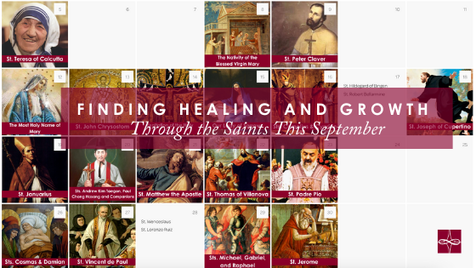

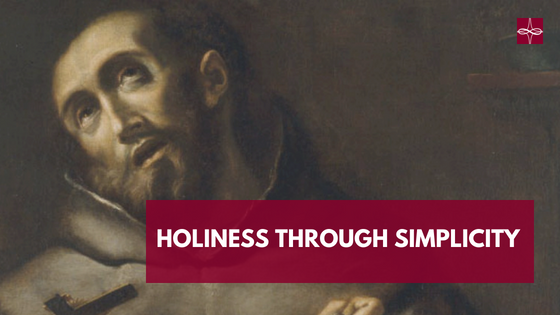

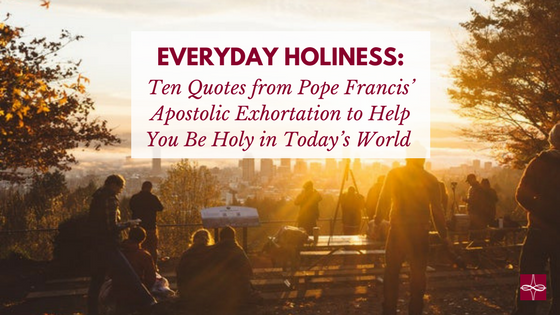

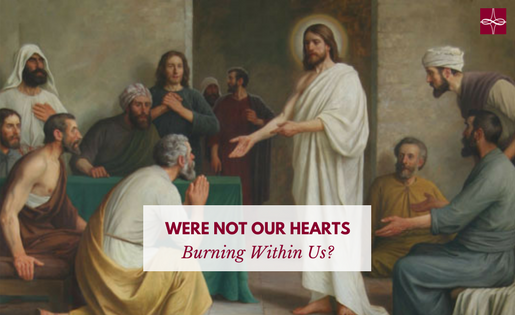

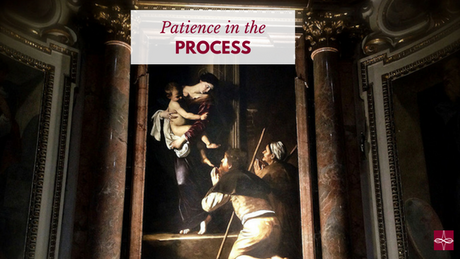

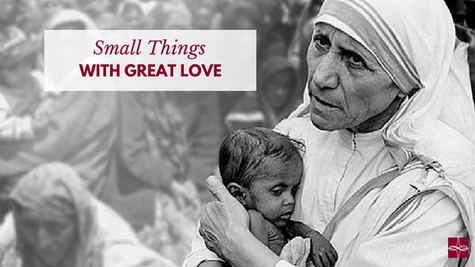

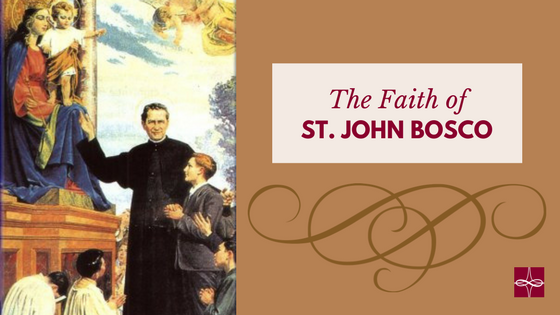

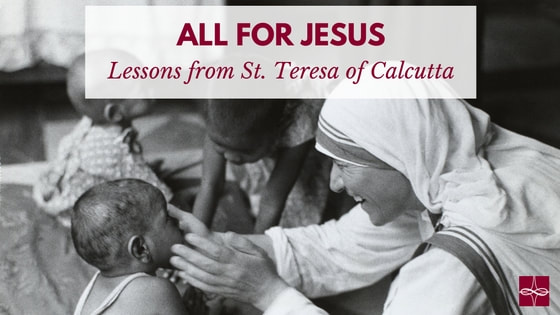




 RSS Feed
RSS Feed